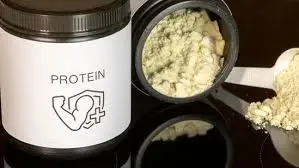From Medical Director Dr. Katie Humphries
Recently, a well-known non-profit, Consumer Reports, released the results of their independent study where they evaluated the level of lead and other heavy metals present in several popular protein supplements. The study suggested that lead levels are high in many. Given the number of Americans — including EHS students — who utilize protein supplements daily, this news is important. But there is no need for panic.
Last week during Community Gathering, I shared my thoughts on this with students. We have encouraged them to use the deButts Health & Wellness Center as a resource but also recommend that families consult with their medical provider at home for guidance about the healthy use of proteins.
First, it’s important for everyone to know that ALL CONSUMABLE PRODUCTS HAVE LEAD AND OTHER HEAVY METALS IN THEM. It’s true. Heavy metals like lead, cadmium and arsenic are naturally-occurring elements in soil. So, anything that grows in, consumes, or touches the soil of our fabulous planet will contain some heavy metals. That is precisely why there are “allowable” levels of these metals in every consumable product. The allowable standards are based on an amount of these metals that can be consumed per serving without known adverse effects to human health. Logically, things that grow in the earth’s soil will have higher naturally-occurring heavy metal content than those that do not (i.e. fruits and vegetables are higher in naturally-occurring lead than meat). So, it shouldn’t surprise us that Consumer Reports detected some highest levels and cautioned consumers against any sort of regular consumption of some supplements.
Like other nutritional supplements, protein ones lack FDA regulatory approval prior to reaching consumers. They are aggressively marketed to consumers, young and old, in stores, online and by coaches, personal trainers, and even healthcare professionals. They come in many flavors and price ranges. They are designed to supplement a diet otherwise deficient in protein intake, but often used to exceed that recommended intake to promote lean muscle building. There’s some science behind the benefits of protein supplementation but even more pseudo-science, speculation and propaganda. Amidst all the conflicting information one can easily find regarding the use of protein supplements, there are only a few things that are consistent and clear — and these are the things we should be telling our teens about protein supplementation while it’s on our minds:
1) The best way to obtain protein is from real foods in your diet.
The average American diet leaves VERY few people deficient in protein. The recommended daily intake of protein is between 20-60 g. There is NO EVIDENCE supporting health benefits to intaking protein above this level for healthy individuals. The meals prepared for our students by EHS’ dining services offer adequate protein sources for every dietary need.
2) Everything in moderation
Protein supplements carry the exact same risks as all other supplements and SHOULD NOT be used daily, in excessive doses, or for prolonged periods of time. We know, with 100% certainty, that there are heavy metals present in at least some quantity in protein supplements. Choosing to take a protein supplement adds heavy metal exposure to that which already occurs with food. Adding this extra exposure daily and consistently over time compounds the effects of heavy metal ingestion in our bodies. It is the compounding effect of these metals that could have potentially devastating health implications. On the contrary, using a protein supplement occasionally and only when your dietary intake is below recommended levels is unlikely to add substantial risk to your health in terms of heavy metal ingestion. This is the message Consumer Reports wants the readers of the study to hear.
3) Ask yourself this: Does the potential benefit of this supplement outweigh the potential risks?
What will you gain from taking the protein supplement? What might happen if the supplement contains something you didn’t expect and that something had a massively negative impact on your health? Is the benefit you’re hoping for worth it?
4) ALWAYS look for evidence of regulatory testing on the labels of any supplement you consume. Read labels. Read them carefully. Look for evidence of non-proprietary regulatory testing.
5) Check reputable sources
See The Clean Label Project and read the specifics of the study by Consumer Reports to help guide your choice of supplements. Don’t buy a supplement based on social media recommendations, or advertisements alone. Remember that supplements are a business — a MEGA business, in fact — and that means tons of money is spent marketing products via methods, and people, who will have the most influence on the public. Chances are high that the people promoting these products don’t even use them…but they’re being paid to tell you they do.
In summary, our students should be careful with protein supplements, now and for the rest of their lives. And of course being careful is good advice for most things that our wonderful teens do!












